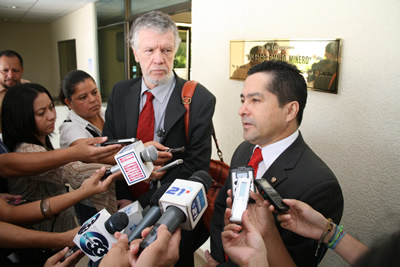An Aggressive Policy Is Needed to Incorporate ICTs in the Production Systems of Latin America
Work area(s)
A two-day seminar was held in El Salvador on information and communications technologies (ICTs) and productive development in the region.

(19 July 2012) At the high-level event held in San Salvador, El Salvador, experts from 10 of the region's countries presented experiences and recommendations on how new technologies can increase the competitiveness and productive capacity of micro, small and medium-sized enterprises.
On 17 and 18 July, country representatives analysed case studies of policies and programmes to incorporate digital technologies in firms and their effects on company competitiveness.
The High-level seminar on information and communications technologies (ICTs) and productive development in Latin America: experiences and policy instruments to facilitate their use and incorporation presented cases from Argentina, Brazil, Chile, Colombia, Costa Rica, Guatemala, El Salvador and Uruguay, as well as local experiences from Asturias (Spain) and Jalisco (Mexico).
At the opening of the event, Armando Flores, Minister of the Economy for El Salvador, stated that his country's challenge was to narrow the technological gap in economic and social sectors, and that the best way to formulate public policy was in a participatory way.
Antonio Prado, Deputy Executive Secretary of the Economic Commission for Latin America and the Caribbean (ECLAC), stressed that, despite regional progress in the dissemination of ICTs, they have not had a significant impact on productivity or social inclusion - unlike the pattern seen in developed countries.
He also mentioned that one of the challenges that new technologies pose to Latin America is how to prevent them from increasing the variations in productivity and existing inequalities in the region. He emphasized the need for structural change as the basis for development, if economic and social gaps are to be closed.
Along the same lines, ECLAC experts recommended the adoption of aggressive public policies to incorporate ICTs in production systems, particularly in micro, small and medium-sized enterprises and sectors that need to improve productivity. Such policies should be part of an active and comprehensive industrial policy aimed at achieving structural change and building equality.
Another recommendation was to generate targeted policies for each sector and type of enterprise. Policies must be complementary, in other words they must integrate capacities that are crucial for development, in order to promote innovation and develop human capital and entrepreneurship.
The ECLAC experts also affirmed that none of the recommendations for incorporating ICTs in micro, small and medium-sized enterprises could be implemented without political will and institutional development.
The seminar was organized by the Ministry of the Economy of El Salvador and ECLAC through ECLAC@LIS2-Dialogue for the Information Society - a project co-financed by the European Commission, with the collaboration of the technological and IT innovation directorate of the Office of the President of El Salvador, the Mesoamerica Project and the Ibero-American General Secretariat (SEGIB).
Any queries should be sent to the ECLAC Public Information and Web Services Section.
E-mail: prensa@cepal.org; Telephone: (56 2) 210 2040.
Follow us on Twitter, Facebook, Flickr and YouTube.
Country(ies)
-
El Salvador
- European Union
Contact
Public Information Unit
- prensa@cepal.org
- (56 2) 2210 2040